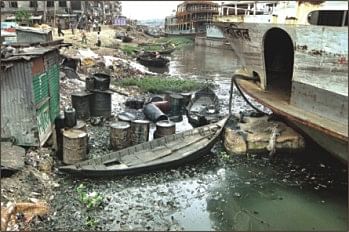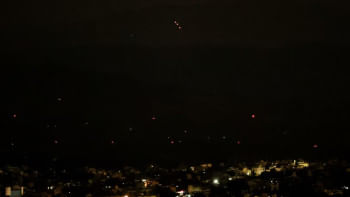Livelihood withers as rivers die

Slicks blanket the Buriganga on the other side of Sadarghat as launches dump used engine oil into the water without thinking of the environmental cost.Photo: STAR
Pollution and loss of navigability in the Buriganga and other rivers surrounding the capital are forcing thousands of people to change their livelihoods.
Many of the fishermen and boatmen who would once depend on these rivers for a living have switched to other professions as the rivers have become too polluted and in places dried up.
Suvadda jelepara [fishermen's quarter] in Keraniganj, a village that would seethe and teem with life even a decade ago, now exists in name only. Once home to nearly 400 fishing families, it currently has only one family continuing fishing as a source of income.
Swapan Das, the lone fisherman at Suvadda, has been in fishing for the last 15 years. Talking to The Daily Star, he said it is quite hard to find fish in the Buriganga these days as the fish population has been severely depleted for pollution in the river.
Fishing in jheels (waterbody) in the area nearby too has become difficult because of pollution. "I'm still in this profession as I did not learn any other skills," he added.
Dhiren Babu of Suvadda, who has been a street vendor since leaving fishing a couple of years back, said many like him had to switch to other professions because of scarcity of fish in the Buriganga and other waterbodies.
"Around 20 years ago, we used to have a boatful of catch from the river every day. Now one can only dream about that," said Dulal Chandra Barman.
"We stopped fishing two years ago. It was a painful decision but we had no alternative. We were already having a hard time due to shrinking quantity of the catch. Things became even worse with the influential locals forcing us to pay for fishing in the jheels."
Left without a fixed job for a long time, Dulal said, “Since I'm not good at other work, hardship has become a permanent feature of my life.”
According to a recent study by the Water Resources Department of Bangladesh University of Engineering and Technology (Buet), the level of pollution in the Buriganga and in most parts of Turag and Norai is so high that no living organism can survive there.
The three-year research also found that the level of oxygen in the water of Buriganga, Turag and parts of Norai is less than one per microgram while the fish need at least four level of oxygen per microgram to stay alive.
Out of 100 families at jelepara of Basila, only 20 are still involved in fishing.
Bikram Chandra Das, 55, who has been a fisher for a living since boyhood said he can fish only for seven months in the Buriganga while he is jobless for the rest of the year.
"My two sons also do not have any job during the lean season, and I have to hawk fish to run my family," he said.
Dayal Rajbangshi of Basila said discouraged by the dwindling fish stock, two of his three sons have taken jobs at an automobile works.
Shahin, who lives near Kaliganj ghat in Keraniganj, said two decades back, there used to be thousands of boats running between ghats (quay) along the Buriganga. But that number, he fears, has come down by at least two-thirds.
Decreasing navigability in the Buriganga has impacts on the canals and other waterbodies connected to the river as well. During the winter, the water in some of them is reduced to a trickle while navigability in the others falls so much that boats become of no use as a means of transport.
Over the years, a good number of canals have dried up leaving no trace. For instance, Mirerbagh canal of Keraniganj that would once link the Dhaleshwari and Buriganga is now a road.
The washermen too are having their share of the effects of river pollution. Those living near the Buriganga cannot wash clothes in the river during the dry season as the water turns too filthy and muddy.
Kamal Das, who has been working at a laundry on Urdu Road since his early teens, said, "I'm not going to have any of my children in this profession as I don't see any future in it.”
Talking about the job switches, urban planning expert Professor Nazrul Islam said the government and non-government organisations concerned should ensure there are alternative jobs or skills training necessary for those leaving traditional and often hereditary occupations.
However, he continued, first and foremost they should take measures to arrest the unabated pollution in the rivers, canals and other natural reservoirs since water is something that people cannot do without.
Those whose means of livelihood are somehow associated with rivers are also subjected to serious health hazards caused by water pollution.
The Buriganga at Kaliganj of Keraniganj has become so contaminated that the locals have long stopped having a bath in its water.
Those who have no choice but to take a dip in the river are dangerously exposed to water-borne diseases.
"I have long been suffering from rashes,” said Delwar Hossain, a boatman of Kaliganj ghat.
Dr Rashid E Mahbub of Bangabandhu Sheikh Mujib Medical University said people involved in livelihoods linked to the Buriganga are more likely than others to have cancer for their contact with chemical wastes dumped in the water.

 For all latest news, follow The Daily Star's Google News channel.
For all latest news, follow The Daily Star's Google News channel. 



Comments